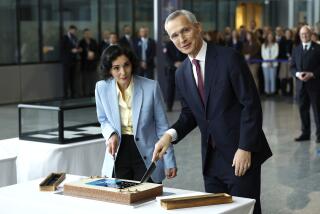Libyan rebels forgiving of NATO error
- Share via
Reporting from Benghazi, Libya, and Tripoli, Libya — Rebel leaders in Libya said Friday that they must accept accidental deaths caused by NATO airstrikes as a consequence of international efforts to protect civilians.
“You have to look at the big pictures. The benefits outweigh the damage,” rebel spokesman Mustafa Gheriani said. “We have to accept these kinds of mistakes and hope not too many take place. NATO is important for us and has saved a lot of lives.”
A NATO-led alliance is leading a battle to prevent Libyan leader Moammar Kadafi’s forces from harming civilians in several parts of the country, especially the rebel-controlled east, where pro-Kadafi forces and those opposed to the longtime ruler have been locked in a battlefield stalemate.
NATO appeared to acknowledge that for the second time in less than a week its actions may have resulted in rebel deaths.
“It would appear that two of our strikes yesterday [Thursday] may have resulted in the deaths of a number of [Transitional National Council] forces,” British Rear Adm. Russell Harding, deputy commander of the alliance’s operation in Libya, told reporters in Naples, Italy.
Harding said the seesaw fighting on the road to Ajdabiya, northeast of Port Brega, had made the situation extremely confusing and hard to track.
“The situation in the area is still very fluid, with tanks and other vehicles moving in different directions, making it very difficult to distinguish who may be operating them. In addition, until this time we had not seen the TNC operating tanks,” Harding said.
He said it was not NATO’s responsibility to try to improve lines of communication with the rebels to avoid more mistaken airstrikes.
Anders Fogh Rasmussen, secretary-general of the North Atlantic Treaty Organization, issued a statement expressing regret for the deaths.
Meanwhile, the United Nations’ first ship carrying humanitarian supplies arrived at the besieged city of Misurata. The ship, chartered by the World Food Program, carried food and medical supplies for the tens of thousands of civilians trapped by Kadafi’s armed forces in the rebel-held city.
World Food Program Executive Director Josette Sheeran described the arrival of the ship in Misurata as “a breakthrough for the U.N. humanitarian operation in Libya.” She said it “allows us to reach tens of thousands of people who are caught in one of the fiercest areas of conflict.”
A former Libyan energy minister who escaped the city on a fishing boat told news outlets that Kadafi’s forces were subjecting civilians in Misurata to constant bombardment, shooting people at random and targeting their access to water supplies.
Omar Fathi bin Shatwan and his family arrived in the island nation of Malta days ago after escaping from Misurata, where he had been for nearly six weeks.
“They bombarded food stores, supermarkets, water supplies and the harbor,” he was quoted as saying. “It has been like this for so long that it has become natural for people. It is scary, but the fear becomes normal after a while.”
Shatwan also said he saw no future for Kadafi or his sons in Libya. He claimed that more officials from the Kadafi regime wanted to defect as foreign minister Musa Kusa had, but were afraid to do so.
He urged NATO to quickly end the conflict by targeting all of Kadafi’s military equipment. “NATO is not doing the job well,” he said.
Times staff writers Henry Chu in London and David S. Cloud in Washington contributed to this report.
More to Read
Sign up for Essential California
The most important California stories and recommendations in your inbox every morning.
You may occasionally receive promotional content from the Los Angeles Times.













